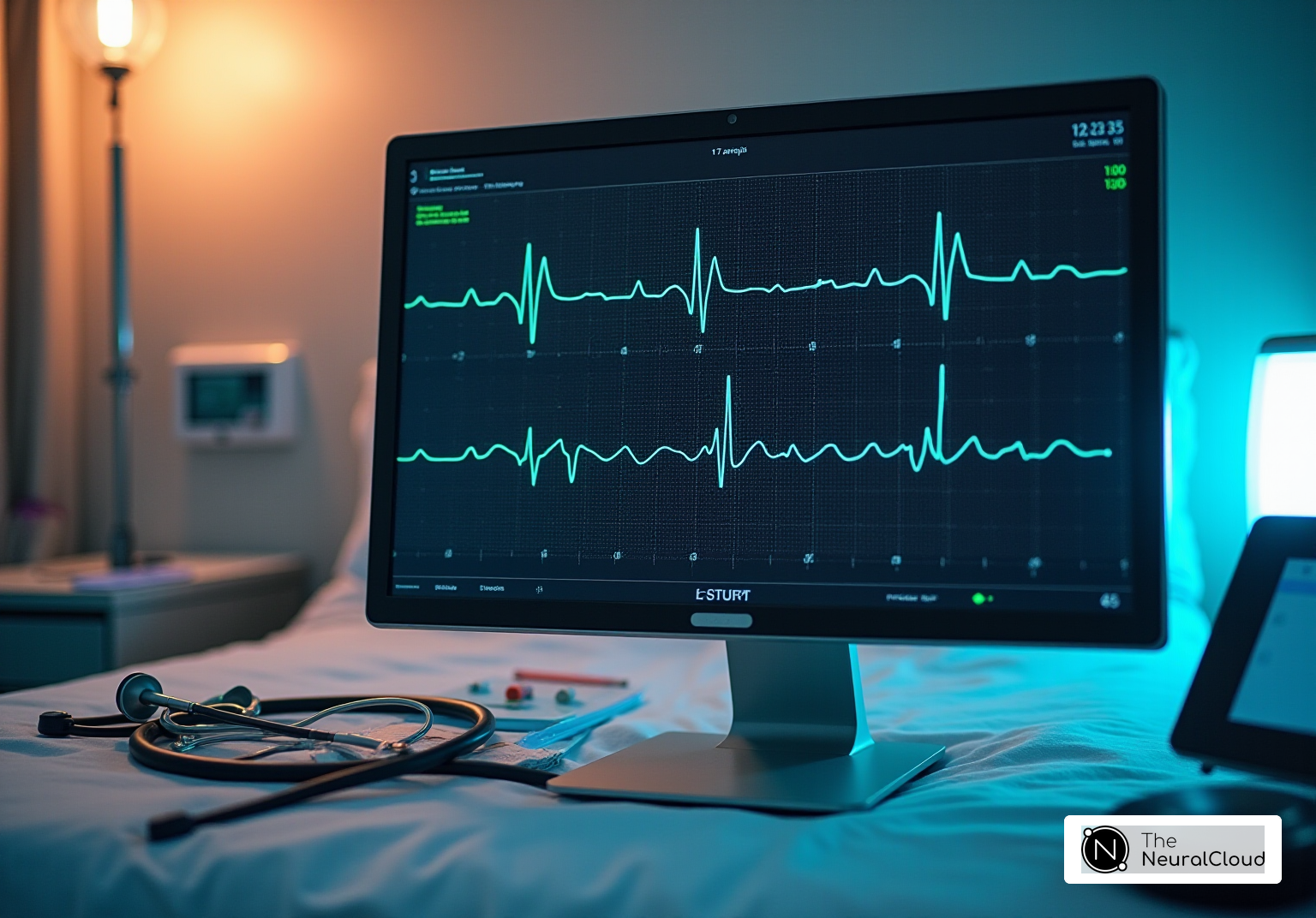Overview
This article provides insights into the challenges of accurate ECG interpretation, particularly for inferior infarcts. It highlights the advanced technology of Neural Cloud Solutions' MaxYield™ platform, which significantly enhances diagnostic accuracy and efficiency. The platform automates processes and reduces noise, enabling healthcare professionals to swiftly identify critical ECG features. As a result, clinicians can make informed decisions that ultimately improve patient outcomes.
The MaxYield™ platform features advanced automation that streamlines ECG analysis, reducing the time required to interpret results. By minimizing noise, it enhances the clarity of ECG signals, allowing for more precise readings. These features translate into significant advantages for healthcare professionals, enabling them to focus on critical decision-making rather than being bogged down by technical challenges.
In summary, the MaxYield™ platform not only improves the accuracy of ECG interpretation but also enhances the overall efficiency of clinical workflows. This leads to better patient care and outcomes, making it an invaluable tool for healthcare providers. By integrating such advanced technology, clinicians can navigate the complexities of ECG analysis with greater confidence and precision.
Introduction
In the realm of cardiac care, the accurate interpretation of inferior infarct ECGs is crucial for timely and effective patient management. Myocardial infarction remains a leading cause of mortality worldwide, making the demand for innovative solutions that enhance diagnostic accuracy increasingly urgent. This article explores the transformative capabilities of Neural Cloud Solutions' MaxYield™ platform, which utilizes advanced AI and automation to streamline ECG analysis, reduce diagnostic errors, and ultimately improve clinical outcomes. Healthcare professionals can harness these cutting-edge tools to navigate the complexities of inferior infarct ECG interpretation, ensuring better patient care.
Neural Cloud Solutions' MaxYield™: Transforming ECG Analysis for Inferior Infarcts
Neural Cloud Solutions' system is at the forefront of transforming ECG analysis through its advanced automation features, particularly in the recognition and tagging of vital cardiac characteristics essential for detecting inferior infarct ECG. By automating the labeling of ECG waveforms, MaxYield™ enhances workflow efficiency, allowing healthcare professionals to concentrate on high-level decision-making instead of labor-intensive manual tasks.
The system employs gold standard noise filtering methods to effectively isolate and label key features in each heartbeat, while eliminating noise and artifacts, including motion artifacts and non-physiological noise that often obscure authentic ECG signals. This innovative platform can analyze over 200,000 heartbeats in under five minutes, enabling healthcare professionals to interpret ECG data swiftly and accurately. Such efficiency is critical for timely interventions in patients experiencing inferior infarct ECGs, ultimately leading to improved clinical outcomes and patient care.
Furthermore, this system is designed for seamless integration into various clinical environments, including mobile and wearable devices, making it a versatile solution for healthcare providers. With its adaptive algorithm that evolves with each use, this system continuously , addressing challenges in ECG analysis and ensuring that critical data is identified even in recordings with high levels of noise and artifact.
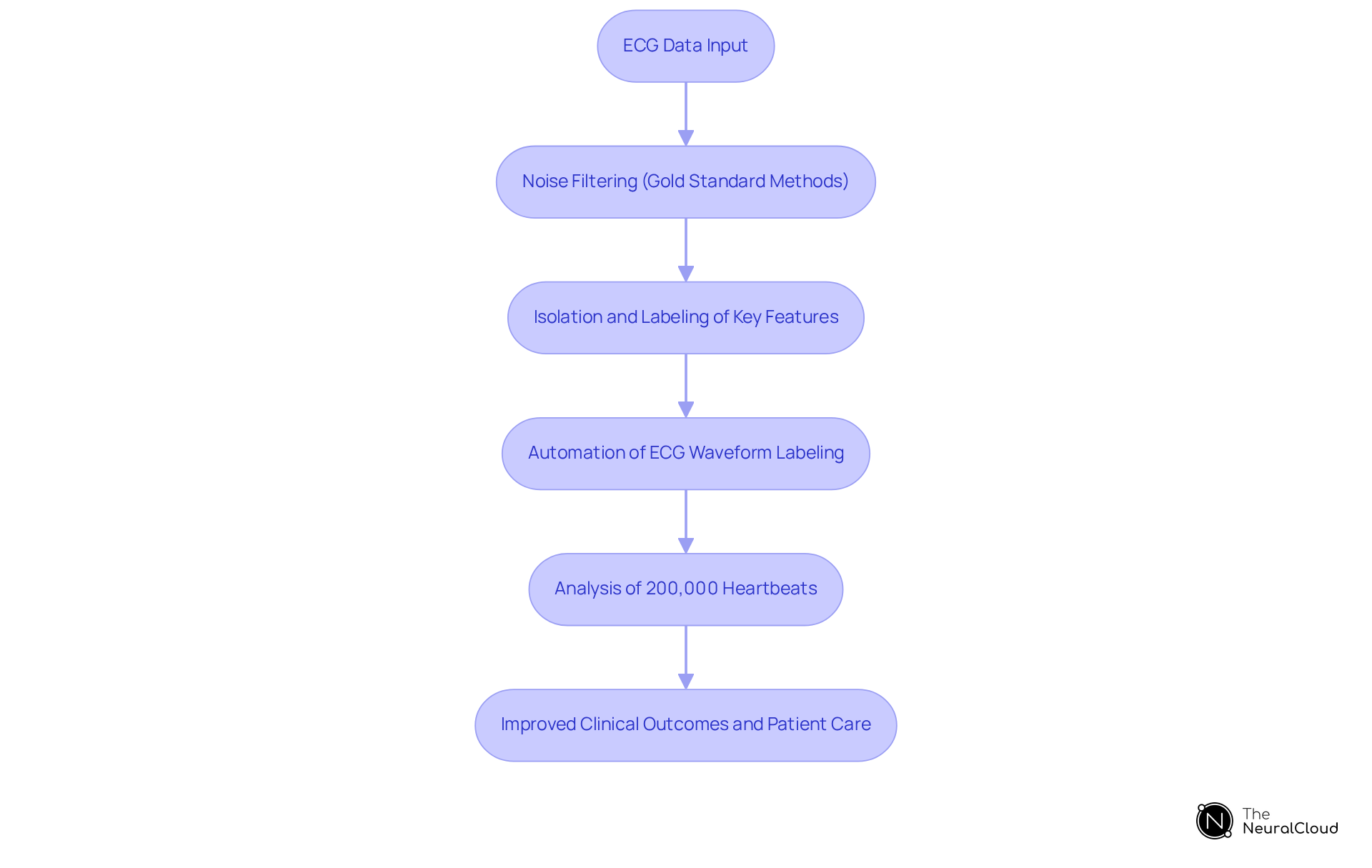
Recognize Key ECG Patterns: Identifying Inferior Myocardial Infarction
Key ECG patterns indicative of inferior infarct ECG include ST-segment elevation in leads II, III, and aVF, accompanied by reciprocal changes in leads I and aVL. Recognizing these patterns is vital for clinicians, as they signal the need for immediate intervention. Myocardial infarction accounts for over 15% of annual mortality globally, with an American dying from MI every 60 seconds, underscoring the urgency of timely diagnosis. These challenges in ECG analysis highlight the necessity for advanced solutions that can streamline the diagnostic process.
The MaxYield™ platform addresses these challenges by automating the tagging of essential attributes in ECG readings. This automation allows healthcare professionals to concentrate on rather than labor-intensive manual evaluation. The platform enhances the speed of diagnosis and improves the accuracy of ECG interpretations, enabling clinicians to respond effectively to cardiac events. Testimonials from cardiologists emphasize the platform's effectiveness in recognizing ST-segment elevation, reinforcing its value in clinical practice.
Moreover, this system skillfully tackles issues caused by noise and signal artifacts in ECG analysis. By offering a thorough solution, it empowers healthcare professionals to provide prompt and knowledgeable care for individuals undergoing an inferior infarct ECG. The integration of advanced AI technology within the MaxYield™ platform represents a significant advancement in the field, ultimately leading to better patient outcomes.
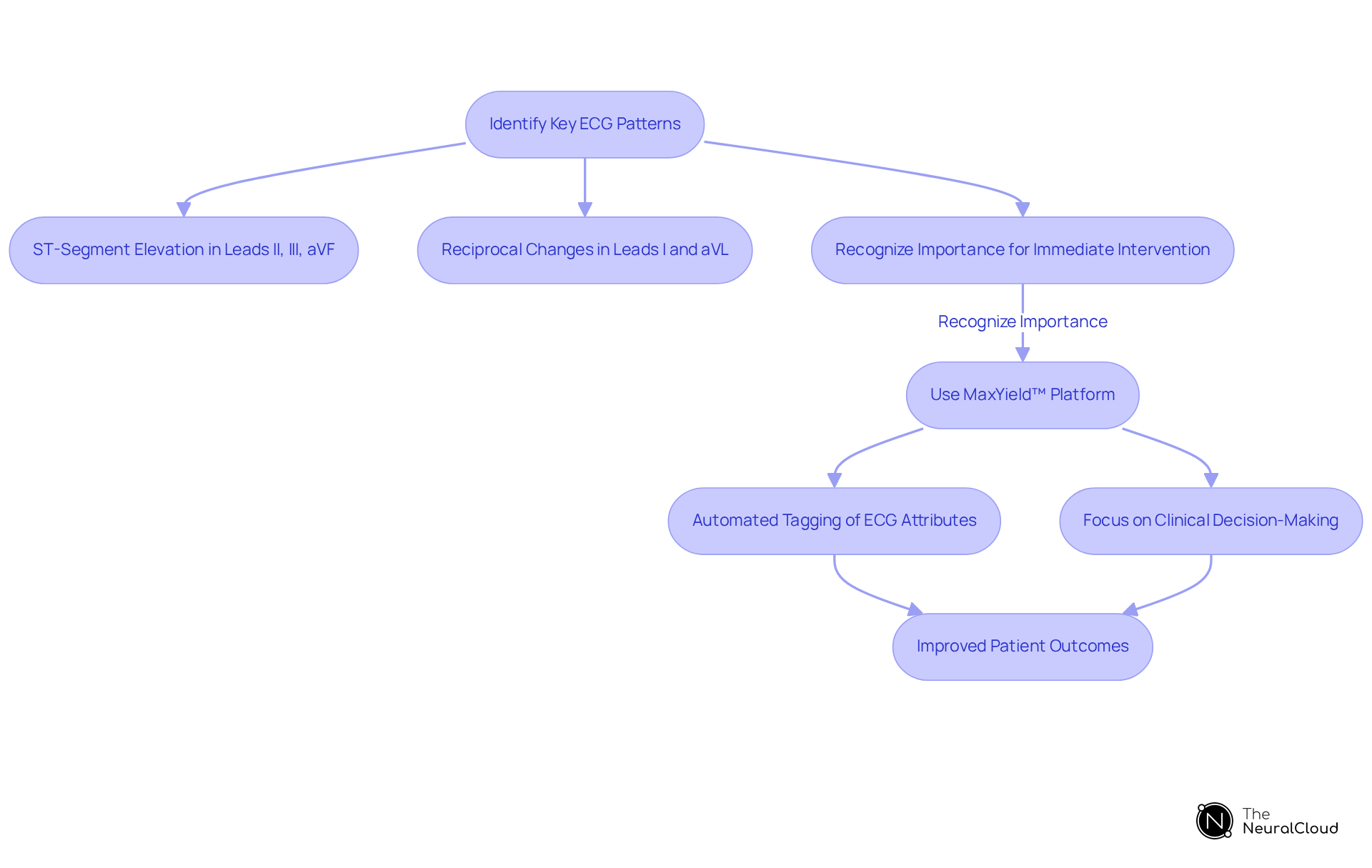
Avoid Diagnostic Pitfalls: Common Mistakes in Inferior Infarct ECG Interpretation
Interpreting inferior infarct ECGs often presents common pitfalls that arise from misidentifying ST-segment changes. These changes can easily be confused with conditions such as pericarditis or early repolarization. Additionally, overlooking reciprocal changes in the inferior infarct ECG can lead to missed diagnoses, complicating the management of patients. The MaxYield™ platform addresses these challenges effectively by automating the identification of critical ECG features and enhancing signal clarity.
This advanced technology allows healthcare professionals to concentrate on accurate interpretations, thereby reducing the likelihood of misinterpretation. By streamlining the analysis process, MaxYield™ improves overall diagnostic confidence, which is crucial for effective patient management. The platform not only helps in identifying potential issues but also empowers clinicians to make informed decisions with greater ease.
Key features of the MaxYield™ platform include:
These features provide significant advantages, such as reducing the cognitive load on clinicians and minimizing the chances of oversight. Ultimately, the benefits of using MaxYield™ extend to and more efficient healthcare delivery.
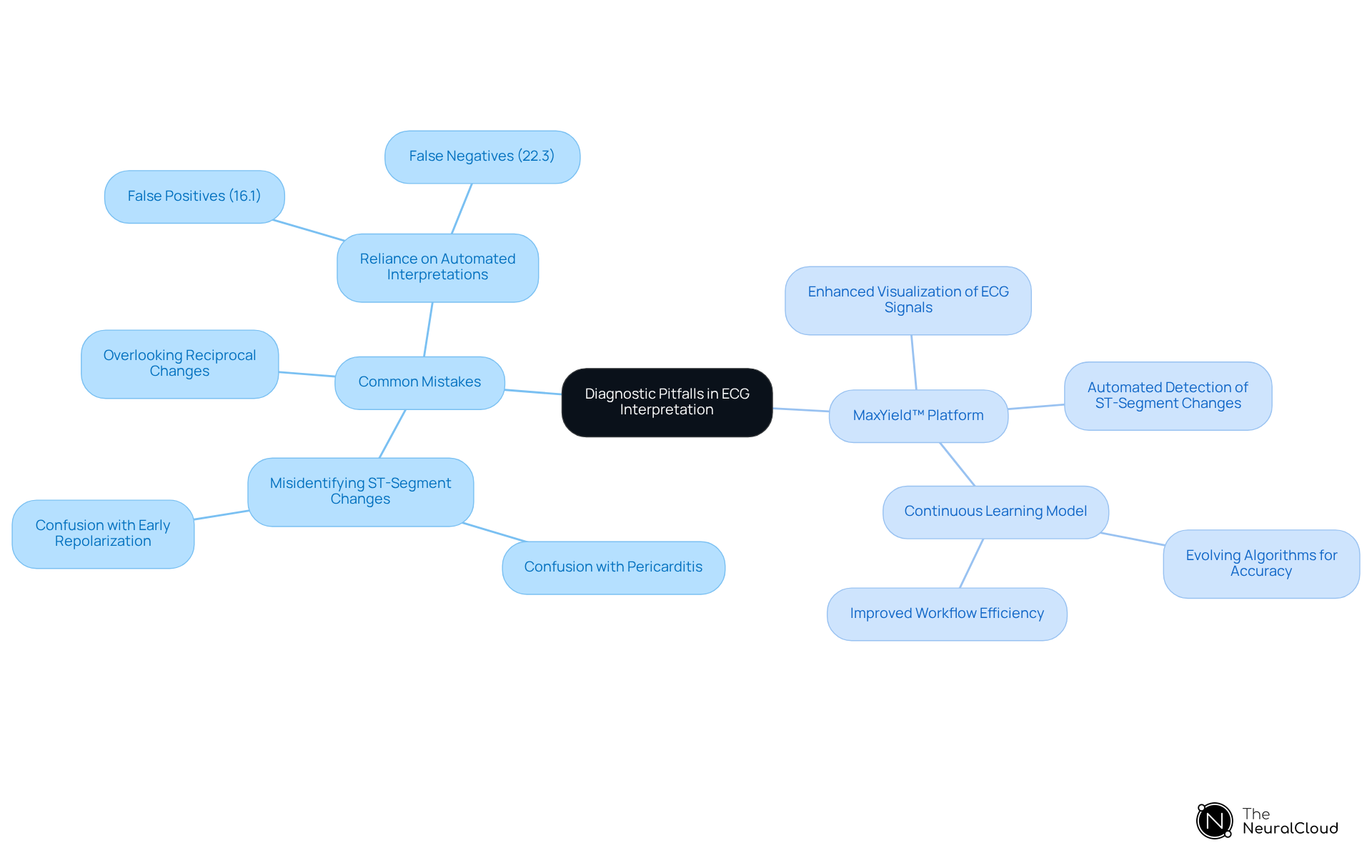
Consider Clinical Context: Enhancing ECG Interpretation for Inferior Infarcts
Interpreting inferior infarct ECG for myocardial infarction presents several challenges, particularly when considering the individual’s clinical context, including symptoms, medical history, and risk factors. For example, a patient with a history of coronary artery disease may exhibit different presentation compared to a younger, healthier individual. 'Neural Cloud Solutions' addresses these challenges by automating ECG analysis and providing comprehensive data insights. This enhancement allows clinicians to effectively correlate ECG findings with clinical information.
The MaxYield™ platform features advanced noise filtering and the capability to analyze 200,000 heartbeats in under five minutes. These capabilities support the identification of key features such as the P-wave, QRS complex, and T-wave. By streamlining the analysis process, this system ultimately aids in supporting confident clinical decisions.
The advantages of utilizing 'Neural Cloud Solutions' are significant for healthcare professionals. Clinicians benefit from improved accuracy in ECG interpretation, leading to better patient outcomes. The integration of automated analysis not only saves time but also enhances the overall efficiency of clinical workflows. With , healthcare providers can make informed decisions more swiftly, ensuring optimal patient care.
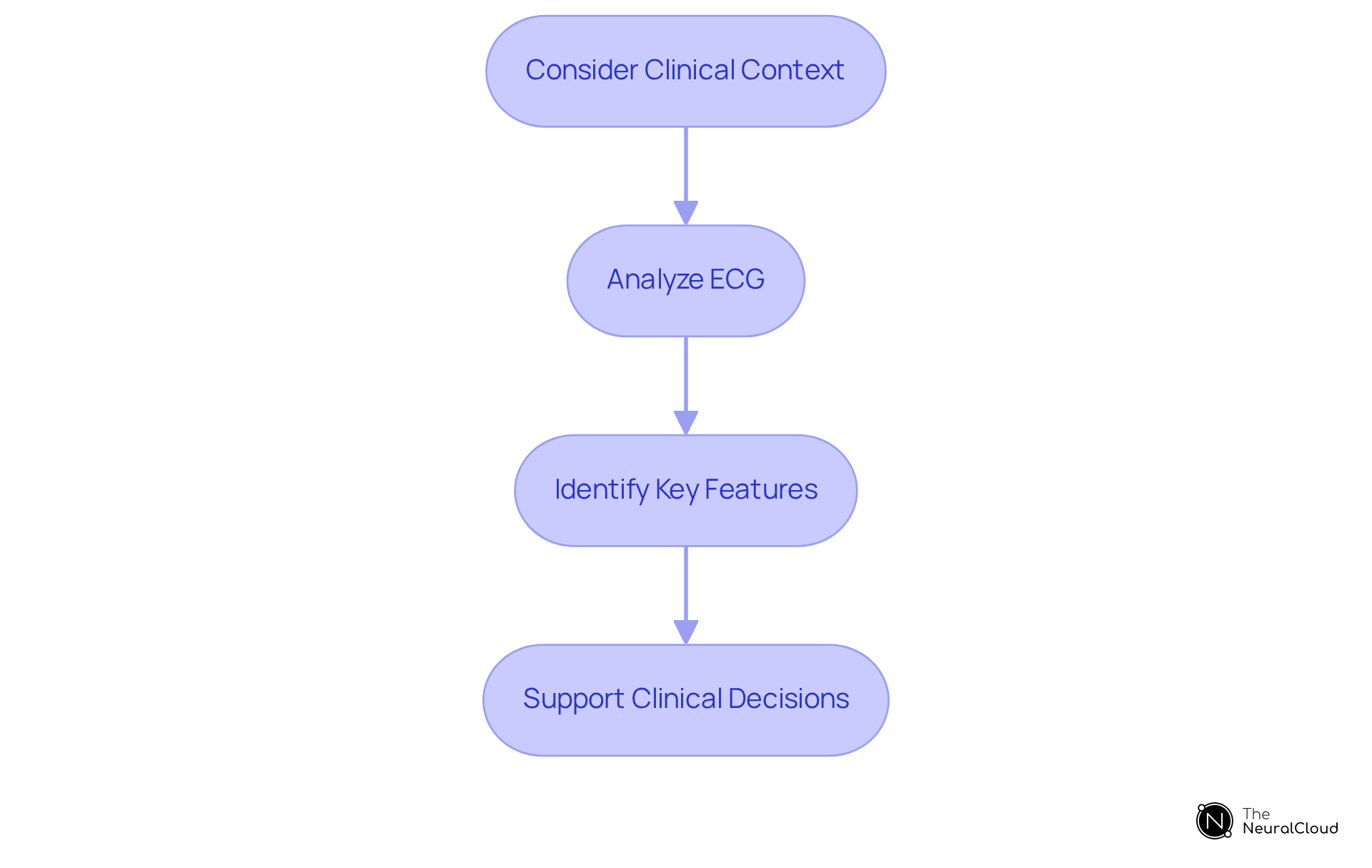
Leverage Advanced Diagnostics: AI and Machine Learning in Inferior Infarct ECG Analysis
AI and machine learning are enhancing the accuracy of inferior infarct ECG analysis. The Neural Cloud Solutions system utilizes advanced algorithms that continuously learn from extensive datasets, enhancing its capability to detect subtle variations in ECG signals. This ongoing learning process positions the system at the forefront of , offering clinicians reliable insights that can significantly influence patient outcomes.
Recent studies demonstrate that AI-enhanced ECG tools can identify structural heart disease with an accuracy of 77%, outperforming traditional methods. As advancements in AI technology progress, particularly for inferior infarct ECG, the integration of these technologies streamlines workflows by automating repetitive tasks and empowers healthcare professionals to make swift, informed decisions, ultimately improving the quality of care.
The system is device-agnostic, allowing seamless data capture from various ECG devices, and processes over 200,000 heartbeats in under five minutes, enhancing both the speed and quality of ECG data analysis.
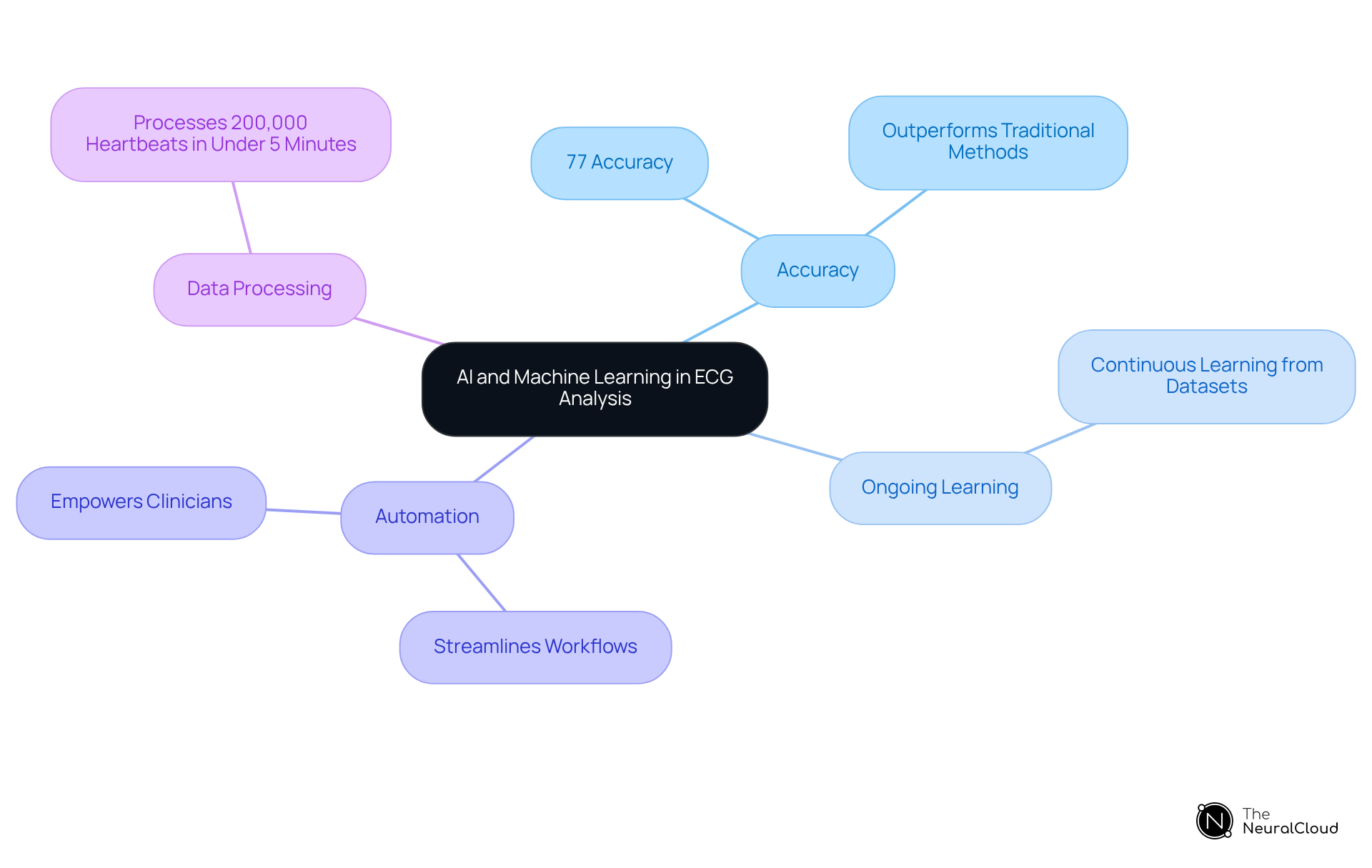
Prioritize Continuous Education: Training for Accurate Inferior Infarct ECG Recognition
Healthcare professionals face significant challenges in ECG analysis, particularly when interpreting conditions like inferior infarct ECG related to myocardial infarction. To address these challenges, is vital. Regular training sessions, workshops, and online courses enable clinicians to stay informed about the latest advancements in ECG technology and interpretation techniques.
The MaxYield™ platform offers sophisticated features that enhance ECG analysis. It provides automated noise suppression and the capability to evaluate 200,000 heartbeats in under 5 minutes. These features not only streamline the assessment process but also serve as a valuable training resource for healthcare professionals.
By utilizing the MaxYield™ platform, professionals can practice and refine their skills in a simulated environment. This platform transforms noisy recordings into detailed insights, allowing for more accurate interpretations. As a result, clinicians can make confident clinical decisions based on high-quality data.
In summary, prioritizing continuous education and utilizing advanced platforms like MaxYield™ equips healthcare professionals with the tools necessary for effective ECG interpretation. This approach ultimately leads to improved patient outcomes and enhanced overall healthcare delivery.
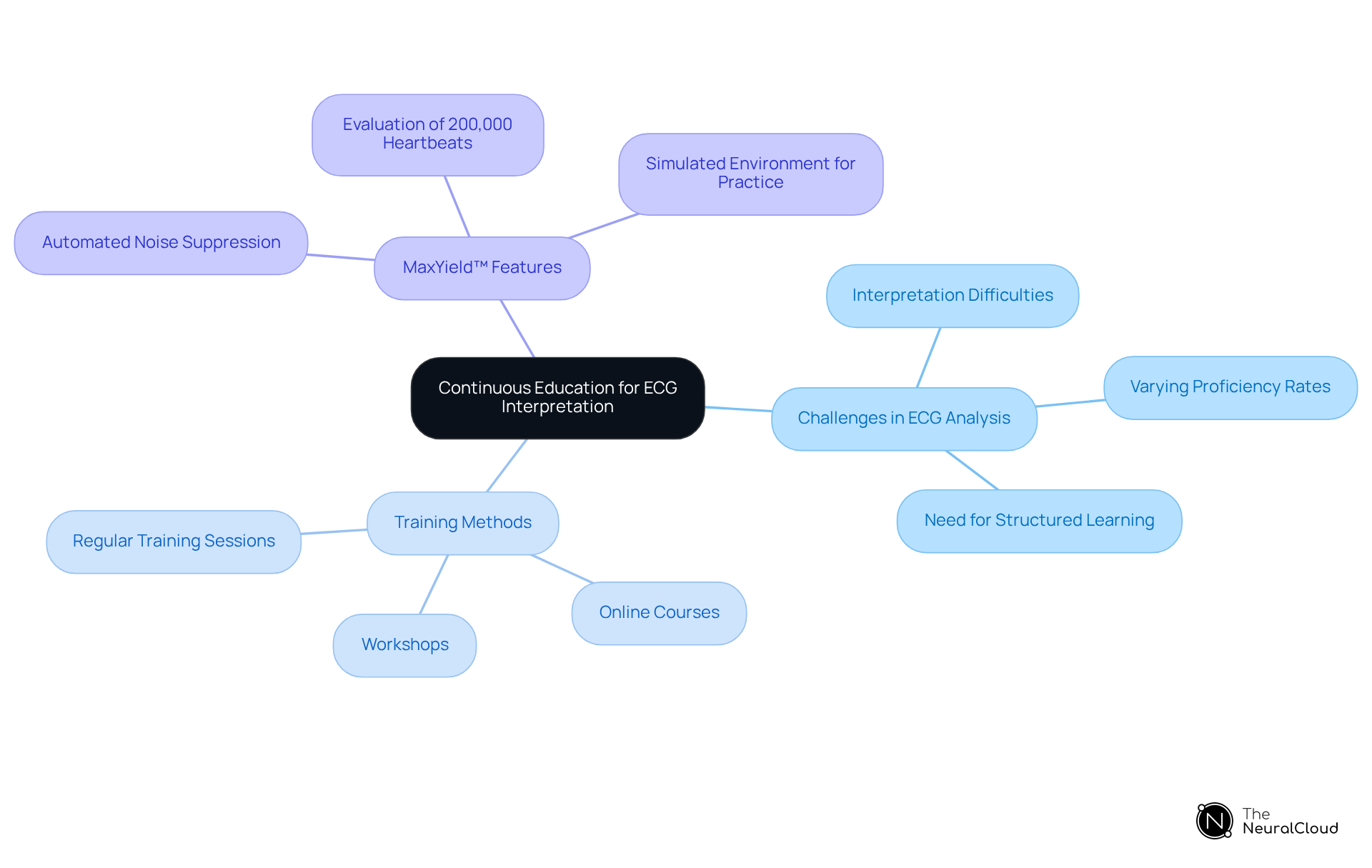
Integrate ECG Tools: Streamlining Inferior Infarct Diagnosis in Clinical Practice
Incorporating advanced ECG tools into clinical practice helps to address the challenges of diagnosing inferior infarct ECG. The MaxYield™ platform automates the analysis process, which significantly reduces the time healthcare providers spend on manual interpretation. This leads to faster decision-making and improved patient outcomes. The system is capable of analyzing 200,000 heartbeats in under five minutes, allowing for seamless integration with existing clinical workflows and facilitating a smooth transition to enhanced diagnostic practices.
This automation not only streamlines the identification of critical ECG features, such as P-waves and QRS complexes, but also incorporates advanced noise reduction and artifact handling. As a result, clinicians receive precise and actionable data. Consequently, healthcare professionals can concentrate on high-level decision-making, maximizing diagnostic yield and optimizing resource allocation within their practices.
For practical applications, user manuals and use cases provide clear illustrations of how the MaxYield™ platform can be effectively utilized across various clinical settings. This ensures that all healthcare providers, regardless of their technical expertise, can leverage the platform's capabilities to .
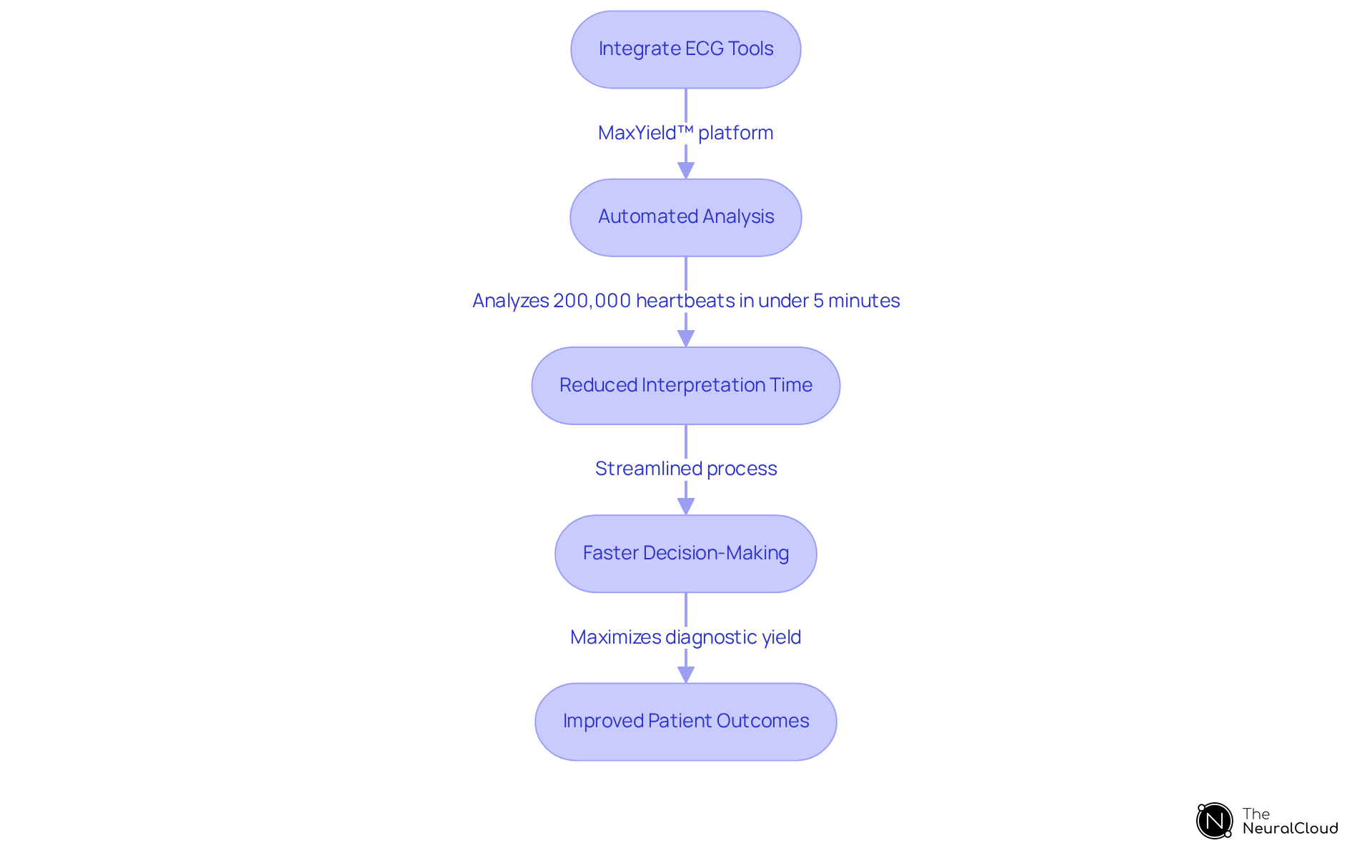
Understand Patient Demographics: Influencing Factors in Inferior Infarct ECG Interpretation
Patient demographics, including age, gender, and ethnicity, significantly influence the interpretation of inferior infarct ECG. Research shows that women frequently display different symptoms and ECG changes than men, which can result in misdiagnosis if not adequately acknowledged.
For example, studies indicate that women may present atypically during myocardial infarctions, underscoring the need for a nuanced understanding of their ECG patterns. The MaxYield™ platform enhances this understanding by delivering customized insights based on demographic data, thus .
By automating the analysis and labeling of ECG waveforms, MaxYield™ allows clinicians to focus on these critical differences, ultimately leading to improved outcomes and more informed clinical decisions.
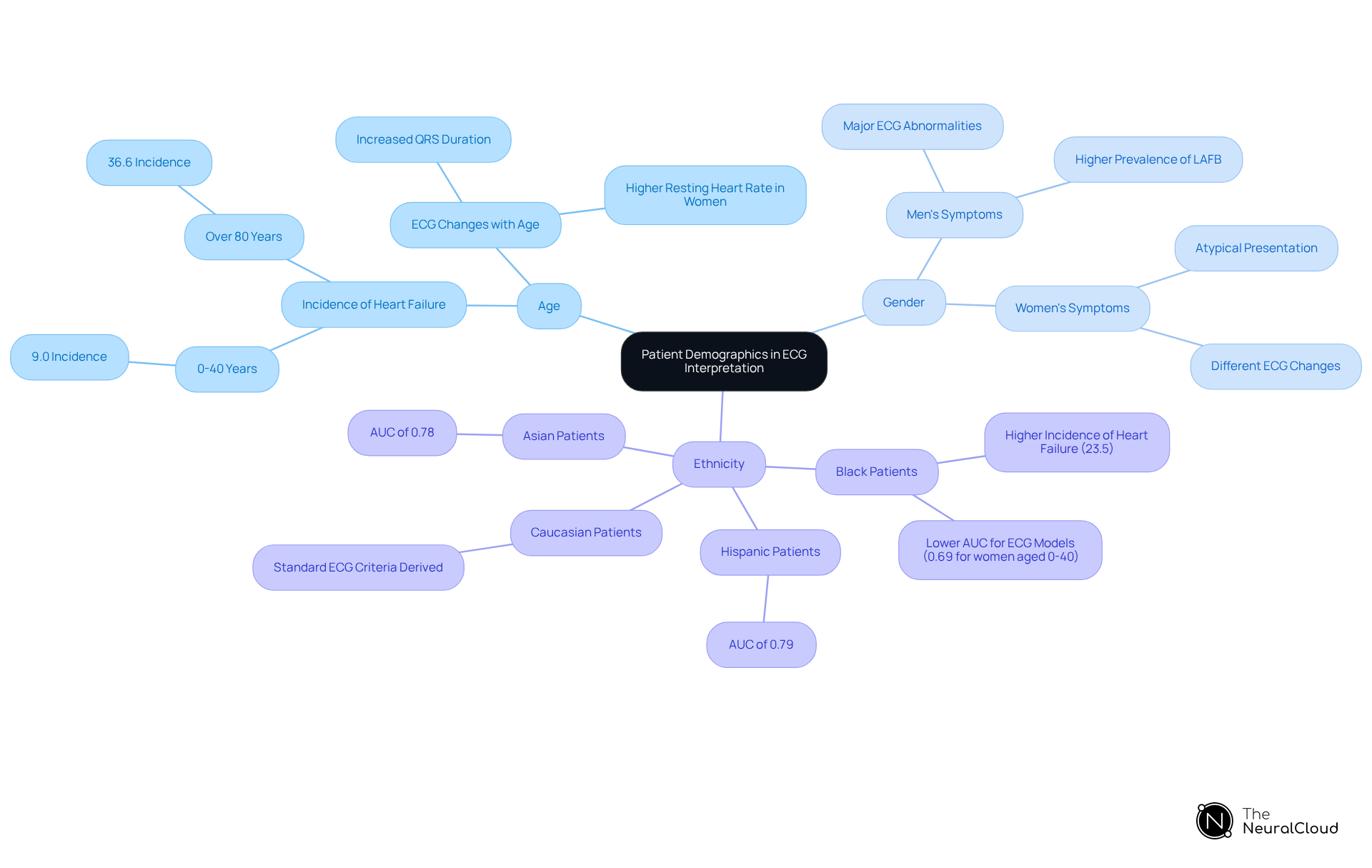
Foster Interdisciplinary Collaboration: Improving Care for Inferior Infarct Patients
Interdisciplinary collaboration among cardiologists, nurses, and technicians is essential for enhancing care for individuals experiencing an inferior infarct ECG. Effective teamwork guarantees thorough attention to individual needs, from precise ECG interpretation to prompt treatment interventions. The MaxYield™ platform plays a crucial role in this process by enhancing communication and enabling data sharing among team members. For instance, its ability to process over 200,000 heartbeats in under five minutes allows healthcare professionals to quickly identify critical ECG features, leading to more informed decision-making.
The system's features significantly , providing healthcare teams with the tools necessary for effective management. Testimonials from healthcare teams highlight the platform's influence on enhancing management of individuals, especially in complicated situations where prompt and precise information is essential. By promoting a cooperative atmosphere and employing sophisticated resources, healthcare teams can significantly improve the quality of care given to patients with inferior infarct ECG.
In summary, the MaxYield™ platform not only streamlines communication among team members but also empowers healthcare professionals with rapid and accurate data analysis, ultimately enhancing patient outcomes.
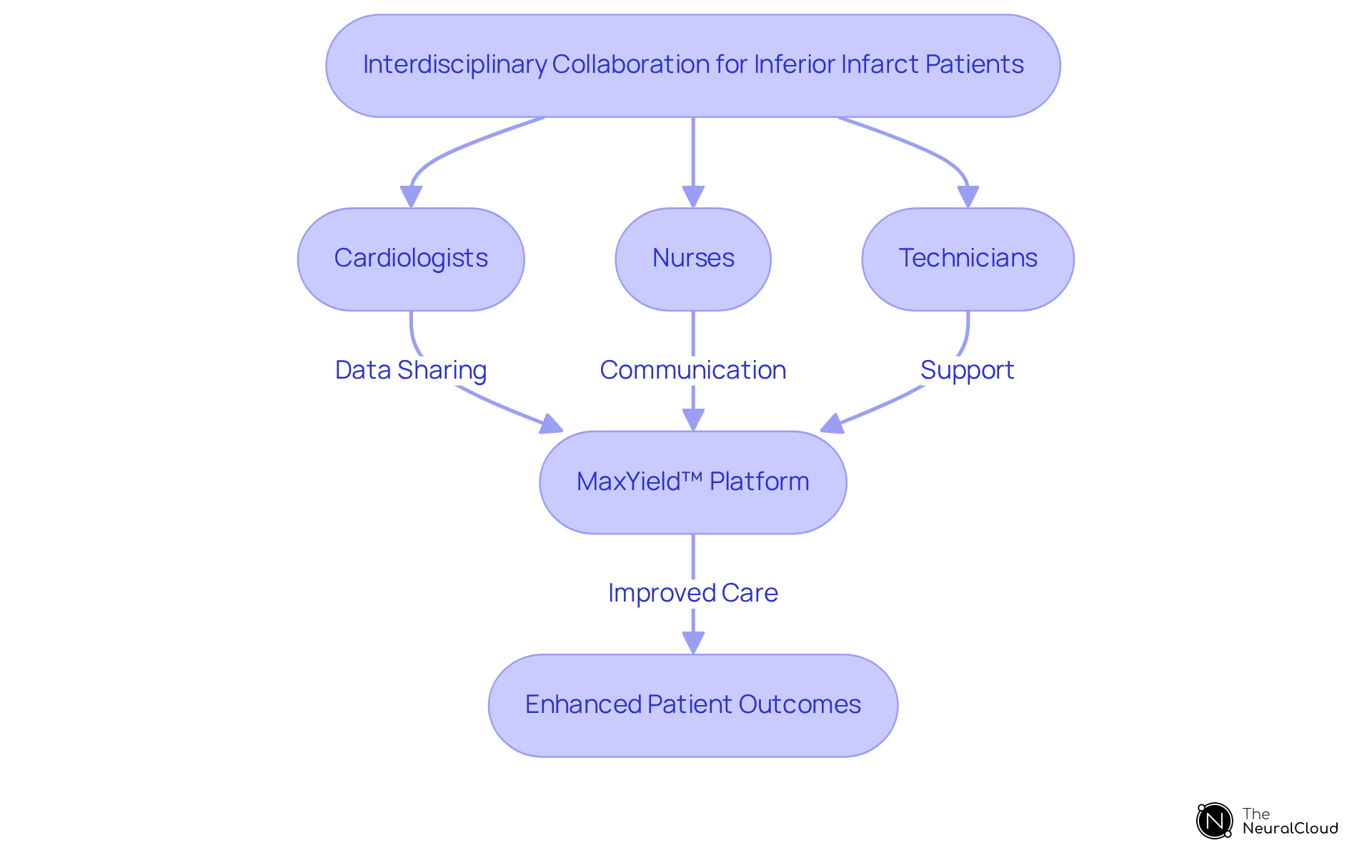
Support Ongoing Research: Advancements in ECG Technology for Inferior Infarcts
Supporting ongoing research in ECG technology is essential for advancing the field and improving diagnostic accuracy for inferior infarct ECG. Innovations in AI, machine learning, and signal processing lead to new methodologies that enhance ECG interpretation. For instance, Neural Cloud Solutions' platform exemplifies this innovation by automating ECG analysis and employing advanced noise filtering techniques. This device-agnostic technology , allowing for the analysis of 200,000 heartbeats in less than 5 minutes, significantly enhancing clarity and efficiency.
A recent study highlighted that wearable devices paired with AI can detect cardiovascular events up to an hour before they occur, achieving sensitivity levels over 90%, similar to hospital-grade monitors. By investing in research initiatives, such as the project at UT Tyler funded by the National Science Foundation to enhance EKG diagnostics, healthcare professionals contribute to the development of cutting-edge technologies like MaxYield™, which supports confident clinical decision-making through automated signal labeling and analysis.
Dr. Laurent Fiorina emphasizes that "developing new AI models to detect cardiovascular conditions is crucial for enhancing health results." This commitment fosters innovation and directly benefits patient care and outcomes, ensuring that clinicians have access to the most reliable diagnostic tools available. The MaxYield™ platform not only improves ECG analysis but also provides healthcare professionals with accurate and timely insights on inferior infarct ECG, ultimately enhancing patient care.
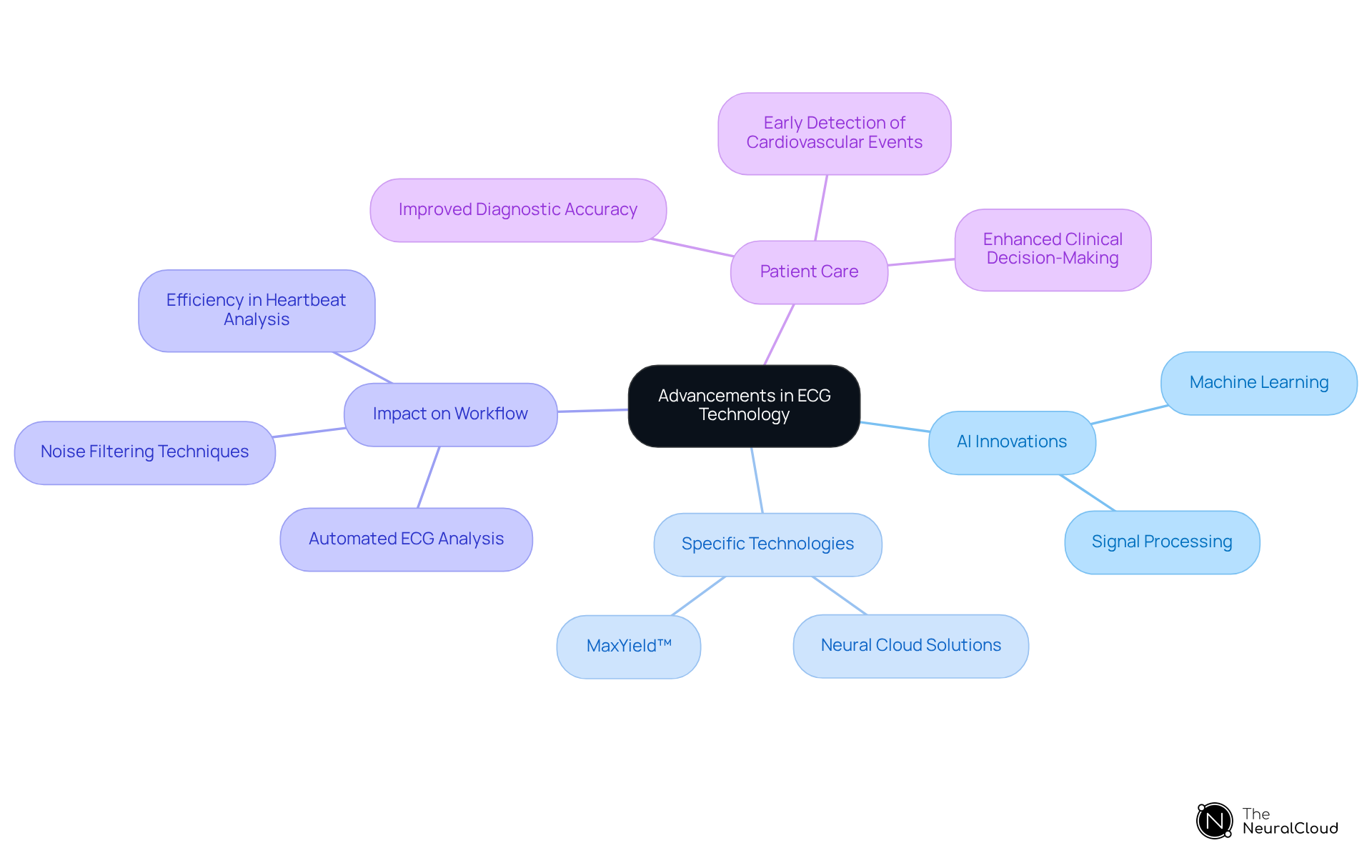
Conclusion
The exploration of advanced ECG interpretation techniques for inferior infarcts underscores the transformative potential of cutting-edge technology in clinical practice. The MaxYield™ platform from Neural Cloud Solutions exemplifies how automation and AI enhance diagnostic accuracy, streamline workflows, and ultimately improve patient care. By concentrating on key ECG patterns, addressing common diagnostic pitfalls, and integrating comprehensive clinical context, healthcare professionals are better equipped to respond effectively to myocardial infarction cases.
Critical insights throughout the article emphasize the importance of recognizing specific ECG changes, such as ST-segment elevations, alongside the necessity for continuous education and training in ECG interpretation. The platform’s capability to analyze vast amounts of data rapidly while minimizing noise and artifacts empowers clinicians to make informed decisions with confidence. Furthermore, fostering interdisciplinary collaboration ensures that teams can leverage these tools to provide comprehensive care for patients experiencing inferior infarct ECGs.
As advancements in ECG technology continue to evolve, it is essential for healthcare professionals to remain informed about these developments and incorporate them into their practice. Embracing tools like MaxYield™ not only enhances diagnostic capabilities but also supports ongoing research and innovation in the field. The commitment to improving ECG interpretation through education, collaboration, and technology ultimately leads to better outcomes for patients, reinforcing the critical role of accurate and timely diagnosis in cardiac care.
Frequently Asked Questions
What is Neural Cloud Solutions' MaxYield™?
MaxYield™ is an advanced ECG analysis system that automates the recognition and tagging of vital cardiac characteristics, particularly for detecting inferior infarct ECGs, enhancing workflow efficiency for healthcare professionals.
How does MaxYield™ improve ECG analysis?
The system automates the labeling of ECG waveforms, employs gold standard noise filtering methods, and can analyze over 200,000 heartbeats in under five minutes, allowing for swift and accurate interpretation of ECG data.
What are the key ECG patterns indicative of inferior myocardial infarction?
Key patterns include ST-segment elevation in leads II, III, and aVF, along with reciprocal changes in leads I and aVL, which signal the need for immediate medical intervention.
Why is timely diagnosis of inferior myocardial infarction critical?
Myocardial infarction accounts for over 15% of annual global mortality, with a significant number of deaths occurring every minute, highlighting the urgency for quick and accurate diagnosis.
What common mistakes occur in the interpretation of inferior infarct ECGs?
Common pitfalls include misidentifying ST-segment changes and overlooking reciprocal changes, which can lead to missed diagnoses and complicate patient management.
How does MaxYield™ help avoid diagnostic pitfalls?
MaxYield™ automates the identification of critical ECG features and enhances signal clarity, allowing healthcare professionals to focus on accurate interpretations and reducing the likelihood of misinterpretation.
What are the benefits of using MaxYield™ for healthcare professionals?
The platform reduces cognitive load, minimizes oversight, enhances diagnostic confidence, and ultimately leads to improved patient outcomes and more efficient healthcare delivery.
Can MaxYield™ be integrated into various clinical environments?
Yes, MaxYield™ is designed for seamless integration into mobile and wearable devices, making it a versatile solution for healthcare providers.
How does the adaptive algorithm of MaxYield™ work?
The adaptive algorithm evolves with each use, continuously enhancing diagnostic yield and ensuring that critical data is identified even in recordings with high levels of noise and artifact.



